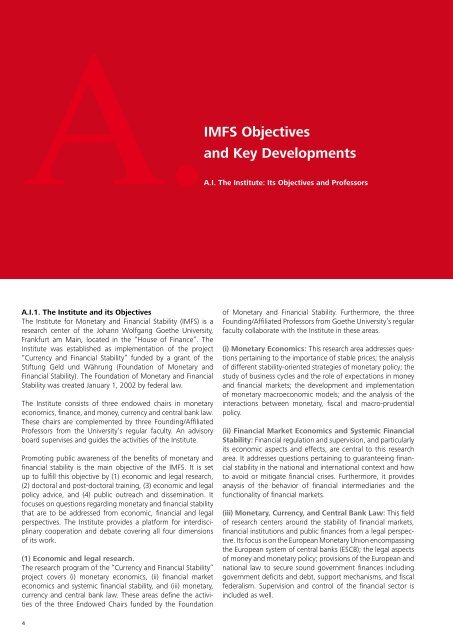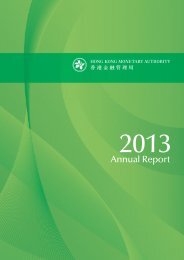IMFS_2009_to_2013_web
IMFS_2009_to_2013_web
IMFS_2009_to_2013_web
You also want an ePaper? Increase the reach of your titles
YUMPU automatically turns print PDFs into web optimized ePapers that Google loves.
<strong>IMFS</strong> Objectives<br />
and Key Developments<br />
A.A.I. The Institute: Its Objectives and Professors<br />
A.I.1. The Institute and its Objectives<br />
The Institute for Monetary and Financial Stability (<strong>IMFS</strong>) is a<br />
research center of the Johann Wolfgang Goethe University,<br />
Frankfurt am Main, located in the “House of Finance”. The<br />
Institute was established as implementation of the project<br />
“Currency and Financial Stability” funded by a grant of the<br />
Stiftung Geld und Währung (Foundation of Monetary and<br />
Financial Stability). The Foundation of Monetary and Financial<br />
Stability was created January 1, 2002 by federal law.<br />
The Institute consists of three endowed chairs in monetary<br />
economics, finance, and money, currency and central bank law.<br />
These chairs are complemented by three Founding/Affiliated<br />
Professors from the University’s regular faculty. An advisory<br />
board supervises and guides the activities of the Institute.<br />
Promoting public awareness of the benefits of monetary and<br />
financial stability is the main objective of the <strong>IMFS</strong>. It is set<br />
up <strong>to</strong> fulfill this objective by (1) economic and legal research,<br />
(2) doc<strong>to</strong>ral and post-doc<strong>to</strong>ral training, (3) economic and legal<br />
policy advice, and (4) public outreach and dissemination. It<br />
focuses on questions regarding monetary and financial stability<br />
that are <strong>to</strong> be addressed from economic, financial and legal<br />
perspectives. The Institute provides a platform for interdisciplinary<br />
cooperation and debate covering all four dimensions<br />
of its work.<br />
(1) Economic and legal research.<br />
The research program of the “Currency and Financial Stability”<br />
project covers (i) monetary economics, (ii) financial market<br />
economics and systemic financial stability, and (iii) monetary,<br />
currency and central bank law. These areas define the activities<br />
of the three Endowed Chairs funded by the Foundation<br />
of Monetary and Financial Stability. Furthermore, the three<br />
Founding/Affiliated Professors from Goethe University’s regular<br />
faculty collaborate with the Institute in these areas.<br />
(i) Monetary Economics: This research area addresses questions<br />
pertaining <strong>to</strong> the importance of stable prices; the analysis<br />
of different stability-oriented strategies of monetary policy; the<br />
study of business cycles and the role of expectations in money<br />
and financial markets; the development and implementation<br />
of monetary macroeconomic models; and the analysis of the<br />
interactions between monetary, fiscal and macro-prudential<br />
policy.<br />
(ii) Financial Market Economics and Systemic Financial<br />
Stability: Financial regulation and supervision, and particularly<br />
its economic aspects and effects, are central <strong>to</strong> this research<br />
area. It addresses questions pertaining <strong>to</strong> guaranteeing financial<br />
stability in the national and international context and how<br />
<strong>to</strong> avoid or mitigate financial crises. Furthermore, it provides<br />
anaysis of the behavior of financial intermediaries and the<br />
functionality of financial markets.<br />
(iii) Monetary, Currency, and Central Bank Law: This field<br />
of research centers around the stability of financial markets,<br />
financial institutions and public finances from a legal perspective.<br />
Its focus is on the European Monetary Union encompassing<br />
the European system of central banks (ESCB); the legal aspects<br />
of money and monetary policy; provisions of the European and<br />
national law <strong>to</strong> secure sound government finances including<br />
government deficits and debt, support mechanisms, and fiscal<br />
federalism. Supervision and control of the financial sec<strong>to</strong>r is<br />
included as well.<br />
4



